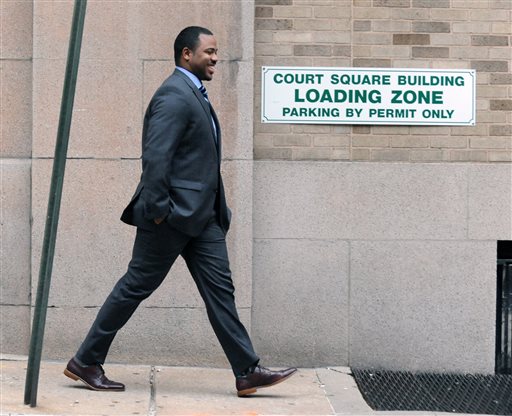BALTIMORE (AP) — Jurors in the manslaughter trial of a police officer charged in the death of Freddie Gray said Tuesday they were deadlocked, but the judge overseeing the case told them to keep deliberating.
The jury sent a note to Baltimore Circuit Judge Barry Williams after about nine hours of discussions over two days. It wasn’t clear if they were stuck on one or more of the four charges Officer William Porter faces. He is the first of six officers to stand trial in Gray’s death.
As the jury deliberated, armored vehicles and police were stationed around the city, and officials promised they were prepared for any unrest. Last spring, parts of the city were burned and looted as frustrations grew over the police department’s alleged mistreatment of blacks.
The note about being deadlocked was jurors’ fifth on Tuesday. Later in the afternoon, they told the judge they would deliberate until 5:30 p.m. EST before going home for the evening.
They earlier requested highlighters, an easel and sticky notes, suggesting they were taking a businesslike approach to assessing Porter’s role in the arrest and death of Gray. The jury also received a set of external computer speakers to improve the sound quality of recordings in evidence, including Porter’s videotaped interview with Baltimore police detectives, police radio transmissions on the day Gray was arrested and cellphone videos made at two of the wagon’s six stops, starting with Gray’s arrest.
In all, the jury heard from more than two dozen witnesses during eight days of testimony. Jurors received about 100 pieces of evidence, and at one point, they took a trip outside the courtroom to look at the police wagon in which Gray was injured. The trial began Nov. 30.
Porter faces charges of manslaughter, assault, reckless endangerment and misconduct. If convicted of all charges, he could face 25 years in prison.
Gray died April 19, a week after his neck was broken while he was in the back of the van with wrists and ankles shackled. The autopsy concluded that the injury probably occurred as Gray slammed against a wall during cornering or braking.
Earlier Tuesday, the judge refused a jury request for the clerk’s list of trial exhibits, since it wasn’t evidence, and denied defense motions for a mistrial and change of trial location. The latter two requests were part of a motion seeking to ask jurors if they’d seen a letter the city schools chief sent home with children Monday, warning of consequences for violent responses to any verdict.
Williams said it wouldn’t be appropriate to query the jury about the letter. The jury has not been sequestered, but they have been warned not to read news articles about the case or talk about it with anyone other than fellow jurors during deliberations.
In closing arguments Monday, prosecutors said Porter could have save Gray’s life with two clicks: one to buckle him in with a seat belt and another to summon medical help with his police radio. Defense lawyers said Porter was not to blame for Gray’s death.
Jurors must determine whether they believe prosecutors, who say Porter’s indifference makes him criminally responsible for Gray’s injury, or the defense characterization of Porter as a conscientious officer who told supervisors to bring take Gray to the hospital.
Porter took the stand in his own defense and testified that Gray showed no signs of pain or distress before he arrived at the police station critically injured.
Prosecutors said this was a blatant lie.
“Freddie Gray went into the van healthy and he came out of the van dead,” prosecutor Janice Bledsoe told jurors.
The transport van “became his casket on wheels,” Bledsoe said.
Gray was arrested while fleeing police in his neighborhood, just seven city blocks from the police station, yet police stopped the van repeatedly during a circuitous trip around West Baltimore that stretched on for 45 minutes.
Bledsoe showed jurors the unfastened seat belt from the transport wagon. “It’s got Gray’s blood on it,” she said.
“Don’t fall for that,” countered Porter’s attorney Joseph Murtha. He argued that expert witnesses disagreed on exactly when Gray’s neck was broken during his trip to the police station, and said this alone should give jurors reasonable doubt.
Gray’s death was indeed a “horrific tragedy” but “there is literally no evidence” Porter is responsible, he said.
Copyright 2015 The Associated Press. All rights reserved. This material may not be published, broadcast, rewritten or redistributed.









.jpg)